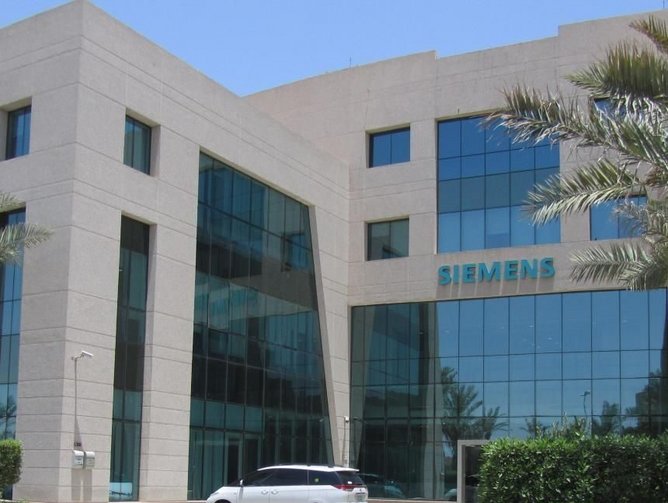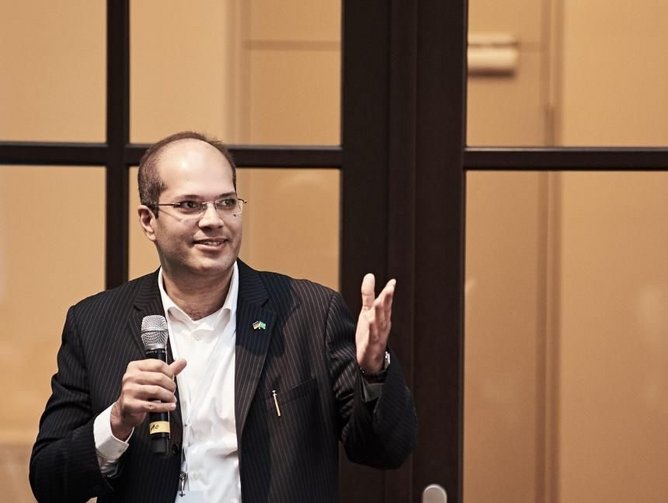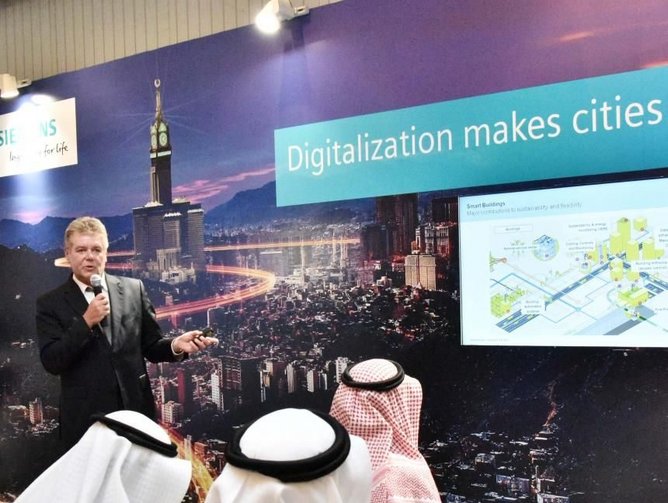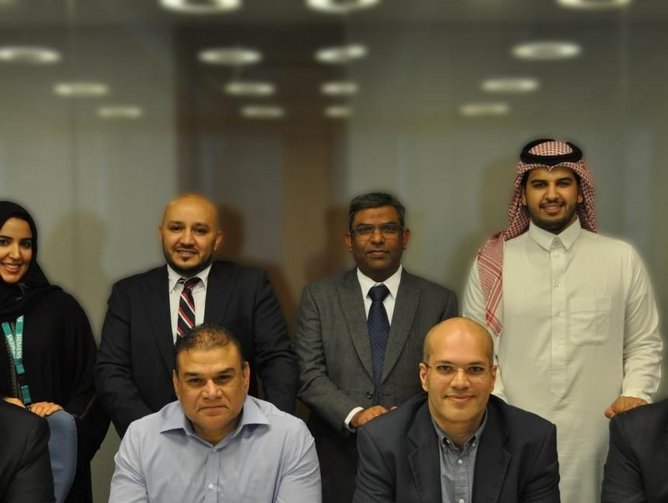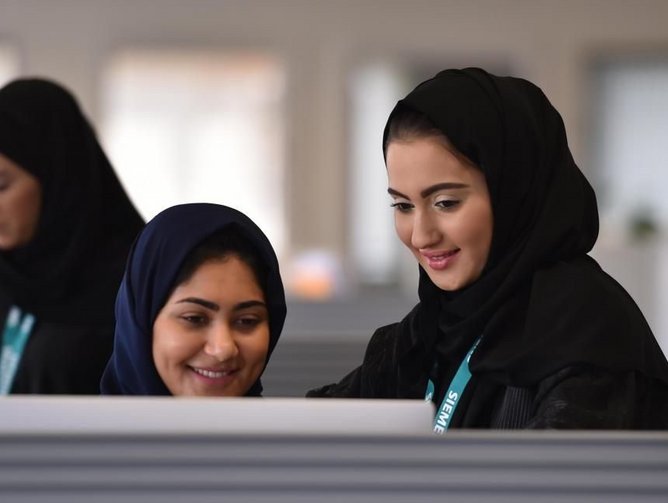How Siemens Building Technologies is revolutionising the construction sector with ingenuity
We spend a large proportion of our lives in buildings and it makes sense that they, in turn, have an enormous impact on our lives.
Studies show that buildings can have a tangible effect on our mood and wellbeing and, as a result, Siemens has made it its driving motivation to create perfect places for its consumers.
Headquartered in Switzerland, the company’s Building Technologies Division has earned a strong reputation for producing cutting-edge technologies for commercial, industrial and public buildings alike.
In doing so, it has become a trusted technology partner for those who want to create comfortable, energy-efficient, safe and secure spaces.
Ahmad Farrakh Manzoor, Head of Building Technologies in Siemens Saudi Arabia and Bahrain, says that buildings aren’t just four walls and a roof. Buildings are alive – and they talk to us with information. Billions of intelligent devices and machines generate massive amounts of data every day, every hour, every second and, with the right digital tools, you can now learn from them and interact with them like never before.
“It’s about making perfect places for people to spend their lives, whether it’s educational spaces, work environments, hospitals or even leisure facilities,” Manzoor explains.
“It’s about creating buildings which allow you to grow, to learn, and feel safe and secure. Today, 90% of our lives are spent indoors and this is why at Siemens we want to make perfect places - perfectly designed for its purpose.”
Siemens Building Technologies is renowned worldwide for its state-of-the-art solutions and innovative thinking but, for Manzoor, what gives the company a competitive edge is the talents and expertise of its staff.
“I think the most important thing is our team,” he observes. “We have a very creative and talented team of people who can explain to our customers how they can benefit from our technologies and what sets our solutions apart. This is the key to our success.
“You can buy fire detectors, thermostats and security cameras from anywhere in the market, but it’s how our team explain the benefit of these technologies and adapt it as per customer needs, so it works for you, is what makes us unique.
“It’s this human element,” he continues. “You need good communicators who can showcase the technology to the customers. It’s about the usage of the technology and ensuring that our customers can use their technology and be successful on their own.”
As one of the divisions within Siemens, Europe’s largest conglomerate, Siemens Building Technologies can also tap into the company’s cross-industry knowledge across sectors like healthcare (Siemens Healthineers), transport (Siemens Mobility) and computer software (Siemens PLM Software).
It is this cross-industry knowledge which means the firm can uniquely provide end-to-end building technology solutions for its customers.
“Siemens is uniquely positioned as the only company in the market who can provide end-to-end solutions,” Manzoor notes.
“We can leverage this breadth of knowledge across Siemens and bring it together with our technologies to create solutions that are useful for our customers.”
This wide-reaching expertise is helping the company create incredible projects ranging from industrial facilities, educational buildings, office spaces and even cinemas, but perhaps the firm’s most notable contribution has been in its creation of smart cities.
The global smart city market has mushroomed in recent years and it’s an industry which Siemens Building Technologies is already tapping in.
Market researchers at Navigant Research have estimated that by 2023, global income from smart technologies will have tripled from its 2013 level – from $8.8bn to $27.5bn.
With the latest industry knowhow and end-to-end solutions, it seems Siemens Building Technologies is readying itself for this fast-growing trend.
“We have a unique position in smart cities,” Manzoor explains. “If you think about what constitutes a smart city, especially in the Middle East, you need three things: smart mobility, a smart grid, and smart buildings. Smart buildings play an immense role with over 70% of energy being consumed by buildings for cooling in the hot summer months.”
In today's ever-evolving technology sector, the company's competitive edge hasn’t gone unnoticed by the business world.
Last year, the German firm took a top spot on Forbes’s list of the World’s Top Regarded Companies, an achievement which Manzoor credits to the innovative, free-thinking work culture that is nurtured at Siemens.
“We are lucky we are seen as an employer of choice,” explains Manzoor. “The company’s reputation greatly helps to attract and retain the very best talent and expertise in the region.
“The company’s work culture has also been key,” he continues. “We’ve created a progressive, forward-thinking environment where there’s no such thing as a bad idea, because even if someone has an idea which isn’t that great, you can challenge each other, and have discussions which could inspire someone else.”
Heading up the Building Technologies Division’s operations in Saudi Arabia and Bahrain, Manzoor believes that the Middle East is a particularly promising region for innovation and technology.
“I wouldn’t say the market is changing fast, I would say it's disrupting fast,” he observes. “If you look at the demographics, the region is unique because of its young, tech-savvy population and high social media penetration. Therefore, it complements our digital offering and smart city business.”
As more and more technologies enter the fray, Siemens Building Technologies has kept pace, if not led the way, when it comes to digital disruption.
“I like to think that buildings can talk, we just need to listen,” explains Manzoor.
“Just like human beings or robots, buildings can talk. We just need to open our ears and listen to them. This is what we do in Building Technologies. We see the data they generate, run analytics on this, and can better predict what's going to happen in the future.
“So, for instance, we’ve been tapping into artificial intelligence to see how buildings can learn from the occupancy patterns of rooms,” he notes. “By using sensors, you can see which rooms are being occupied every day and which are not. Then, using artificial intelligence we can predict when it will be occupied in the future and you can adapt the air conditioning, for instance, to suit this. You can also make the building owners more aware which rooms and spaces they can free up and reuse across their portfolio.
“The building can automatically cool up the room if it predicts there’s going to be a conference. By doing this, you’re not only making the building smarter, you can also save electricity, improve productivity, and make it more comfortable.”
Finding the right balance between comfort, building performance and sustainability is a task which Siemens has mastered over the years.
According to the firm, buildings represent 40% of the world’s primary energy use and so creating energy-efficient buildings is more important than ever.
As such, Siemens has set itself an ambitious goal to become the world’s first major industrial company to be completely carbon neutral by 2030. To achieve this, it is investing in technologies such as energy management systems and automation system for buildings.
This commitment isn’t just good for corporate citizenship, it’s also good business, says Manzoor.
“The company plans to cut its carbon dioxide (CO2) emissions in half by 2020 and then to be completely carbon neutral by 2030. This requires a lot of funding so we are investing around €100mn ($118.75mn) in improving our energy efficiency so we can make our planet better. We like to walk the talk.”
In conjunction with its high sustainability standards, Siemens has also led the way as a strong champion of high safety and security protocols.
“We’ve seen many safety and security incidents across the world and so our mission is to create perfect places for everybody which are, most importantly, very safe and secure; but don't just ask us, ask our customers,” Manzoor says.
“Most mission critical facilities in Saudi Arabia use Siemens’ Building Technologies, whether it’s the oil and gas industry or hospitals. Now, the one of the very first cinema complex has opened its doors in Saudi Arabia and guess who they chose to implement fire detection within those cinemas? Siemens.
“We're very excited and, of course, we're very proud that the Cineplex is using our technology,” he adds. “There are around 350 cinemas with more than 2,500 screens planned to open in Saudi Arabia by 2030. The Kingdom has a vibrant society and is investing heavily in entertainment. It’s a promising, emerging market for us and we're very excited about it.”
Whether creating cinemas or shopping malls, museums or university lecture halls, Siemens has earned its stripes as a leading building technology provider.
As Manzoor highlights, buildings can talk and if you have the right tools and analytics, and it's clear that Siemens Building Technologies is there to listen.
